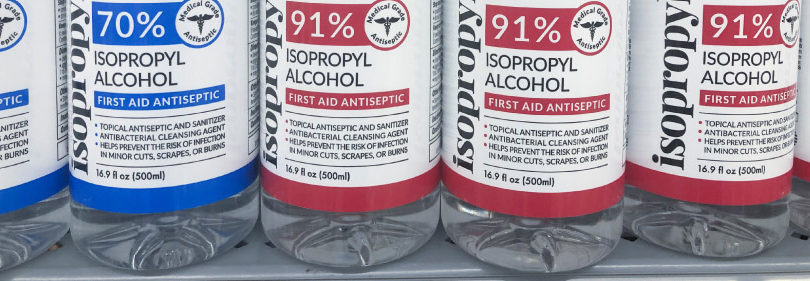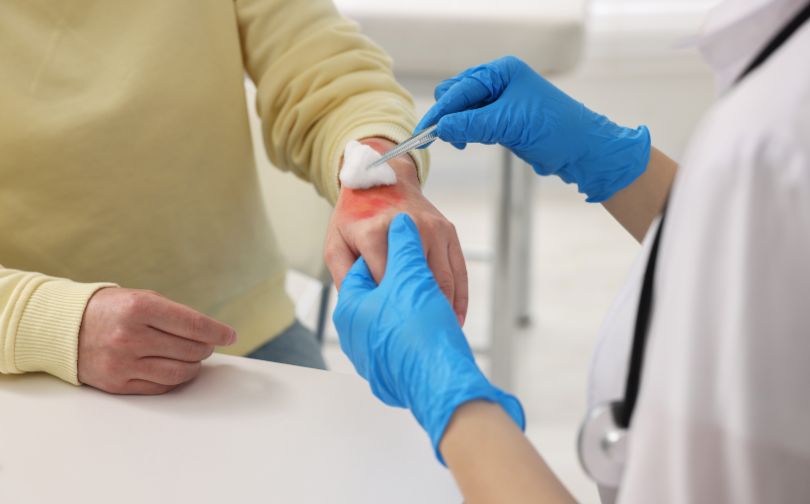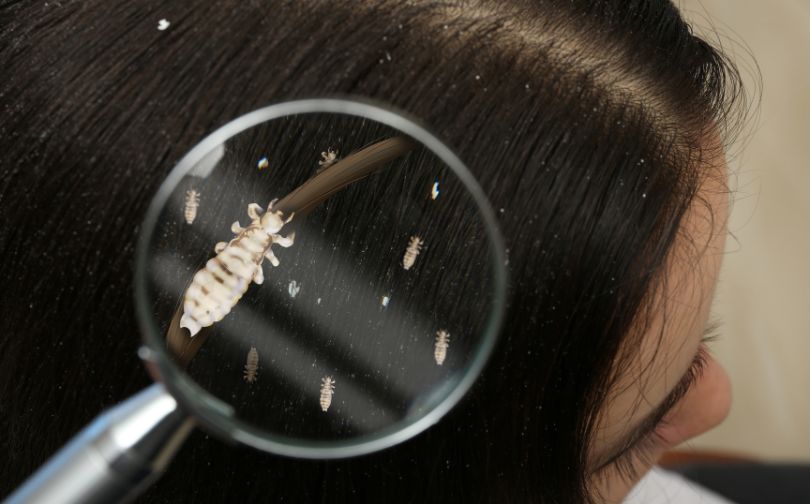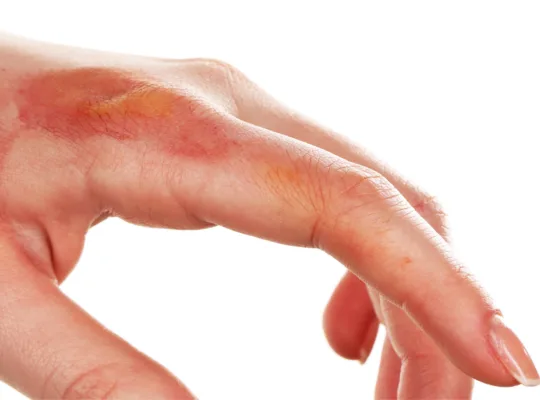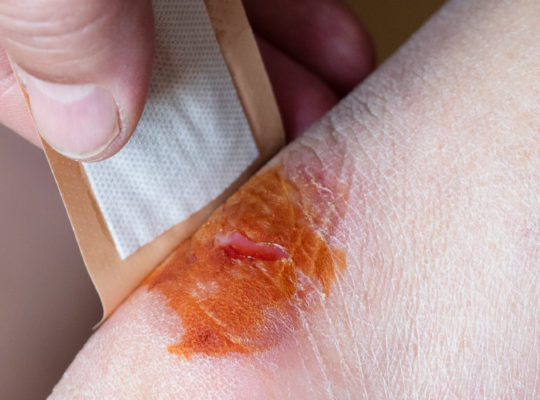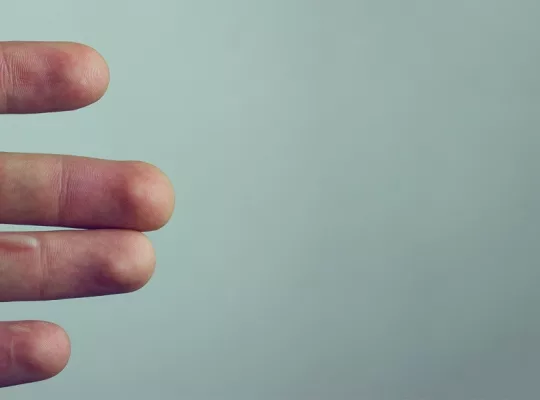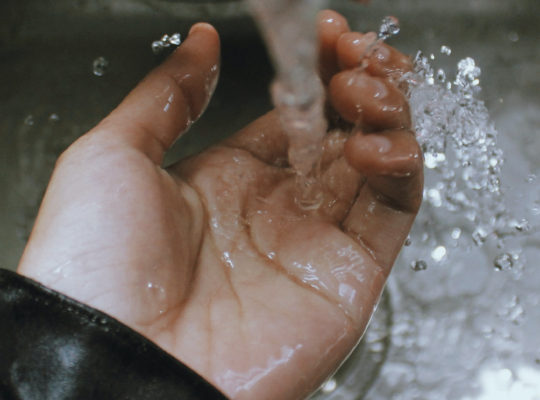When accidents happen, quick and effective first aid is crucial. Alcohol is a common household item, but many people aren’t sure how to use it correctly in emergencies. Misunderstanding its role can lead to improper treatment or even worsening the situation.
For instance, while alcohol can disinfect a wound, using it on a large cut can cause intense pain and tissue damage. Knowing when and how to apply it can make a significant difference in care.
Did you know that alcohol’s disinfecting properties work best on small, unbroken areas of skin? With the right knowledge, it can be a helpful part of your first aid kit.
In this guide, we’ll clarify the best practices for using alcohol in first aid situations, helping you avoid common mistakes and ensuring safe, effective care.
Using Rubbing Alcohol in First Aid
As we’ve covered, rubbing alcohol is really good at killing germs and bacteria around the house. This makes it a very good item to have in both your medicine and custodial cabinets.
Using a paper towel or a cotton swab to clean a wound is very effective at preventing infections. It’s important that you don’t use too much. You could experience skin irritation or have to suffer until it all evaporates. After disinfecting the wound, cover it with an elastic bandage, with a gauze pad if it is bleeding. Properly disinfected and dressed wounds will heal faster, and there will be a lower chance of scars forming.
What About Hydrogen Peroxide?
Hydrogen peroxide is another very common antiseptic and was commonly used in first aid until recently. Hydrogen peroxide has received a lot of attention and has had its medical applications reexamined. The FDA classifies hydrogen peroxide as being “generally recognized as safe” but it can cause skin irritation and severe damage to your eyes. Medical professionals have differing opinions on using hydrogen peroxide to clean your wounds. I would recommend doing your own research on which doctors and clinics are for and against using hydrogen peroxide and make your decision based on that.
If you decide that you will no longer use hydrogen peroxide to clean your wounds, don’t throw it out. It still has plenty of uses, which I will detail later.
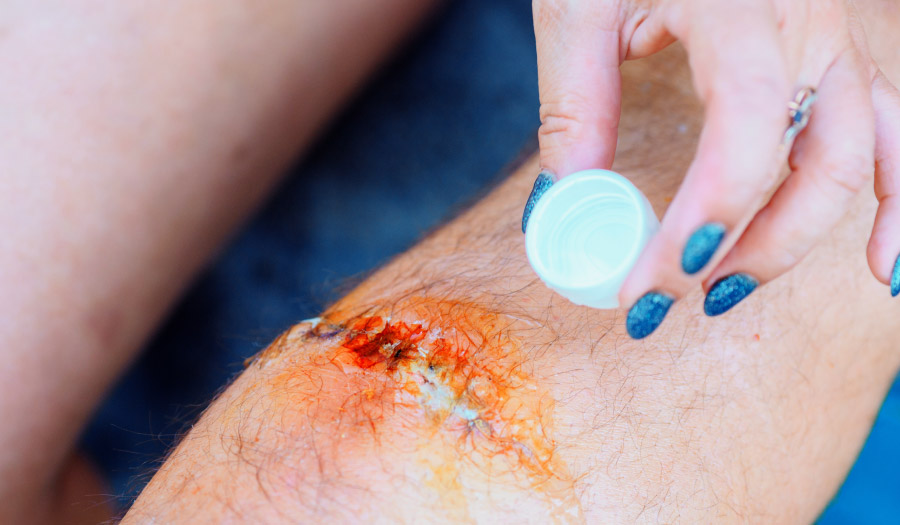
Hydrogen Peroxide and Rubbing Alcohol for Cleaning
Here I will detail a couple of helpful things you can do with both rubbing alcohol (RA) and hydrogen peroxide (HP) outside of cleaning wounds. Unless directed otherwise, use 70% rubbing alcohol.
- RA and HP can disinfect toothbrushes and beauty supplies. Give the head of a toothbrush, makeup-brush, or the working end of a manicure or pedicure tool a quick rinse, dip, or soak of either solution, rinse well with warm water, then let air dry.
- RA and HP can disinfect sponges, greatly extending their lives. Simply soak the sponge in rubbing alcohol or a mixture of 50% hydrogen peroxide and 50% water, then squeeze and let air dry.
- RA and HP can easily disinfect lots of surfaces around the house without leaving stains. Put either RA or HP in a spray bottle for soft surfaces like furniture, and for hard surfaces, a damp cloth or a spritz are very effective at getting rid of bacteria. Don’t use HP or RA for permeable hard surfaces like granite or quartz. When spraying hard surfaces with HP, make sure to wipe it off with a wet cloth. The rubbing alcohol will evaporate on its own, hydrogen peroxide will not.
- HP is a great way to sanitize your cutting boards. HP will efficiently clean and sanitize the scratches in both wood and plastic cutting boards. Either spray, or scrub with a clean sponge and then rinse.
Rubbing Alcohol For Household Cleaning
- 90%+ RA is a great cleaner for electronics. Using a small amount of RA on a cloth or cotton swab can quickly and efficiently disinfect your electronic devices without harming them.
- RA is also great for removing frost from glass. For your car’s windshield use a 2:1 mixture of RA and water in a spray bottle to make scraping much easier. For your windows use 8:1 water to rubbing alcohol on a cloth.
- RA can clean jewelry. Soak the item in RA for a few minutes and then wipe with a clean cloth to help restore shine.
When should you avoid using rubbing alcohol?
Rubbing alcohol is a common household item, often used for disinfecting or cleaning. However, there are situations where using it can be harmful. Misusing rubbing alcohol can lead to health risks, skin damage, or even fire hazards. Below are some instances where you should avoid using rubbing alcohol.
- Fever Reduction: Rubbing alcohol should not be used to lower a fever. It can be absorbed through the skin and lead to alcohol poisoning, particularly in children.
- Bathing: Never add rubbing alcohol to bathwater. Extended exposure to alcohol on the skin can result in toxicity, as the substance can enter the bloodstream.
- Treating Acne or Skin Conditions: Rubbing alcohol can dry out the skin, potentially worsening acne or other skin issues. This can lead to irritation and slow the healing process.
- Treating Lice: Although it can kill lice, rubbing alcohol may cause scalp irritation. There are safer and more effective treatments available for lice removal.
- Ingestion: Drinking rubbing alcohol is extremely dangerous and can result in severe poisoning. Symptoms may include vomiting, diarrhea, and sedation, and in extreme cases, coma.
- Mixing with Bleach: Combining rubbing alcohol with bleach releases toxic gases, which can harm the lungs and pose serious health risks.
- Near Open Flames: Since rubbing alcohol is highly flammable, using it near open flames or heat sources creates a significant fire hazard.
- On Certain Surfaces: Avoid using rubbing alcohol on materials like varnished wood or fabrics like rayon and acetate, as it can cause permanent damage.
Conclusion
When dealing with emergencies, having the right tools and knowing how to use them matters. Alcohol, while effective in some situations, must be applied carefully to avoid complications. Its benefits in small cuts and surface disinfection are evident, but improper usage can lead to unwanted side effects.
We also explored alternatives like hydrogen peroxide, which presents its own set of pros and cons. While still helpful in many cases, medical opinions vary on its use for wound care.
Understanding how alcohol and similar products work in both medical and household settings ensures better safety and care. When used correctly, they are valuable assets in maintaining hygiene and treating minor injuries.
FAQs
Can Rubbing Alcohol Be Used to Treat Severe Wounds?
Rubbing alcohol should not be used on severe wounds like deep punctures, animal bites, or serious burns without consulting a doctor. It can irritate tissues, delay healing, and worsen the injury. For such wounds, professional medical care is recommended to ensure proper treatment and infection prevention.
How Should Rubbing Alcohol Be Applied to a Cut?
To apply rubbing alcohol on a cut, first clean the area with water. Gently apply a small amount using a cotton pad. Let the area air dry before covering it with a sterile bandage. Use in a well-ventilated space to avoid inhaling fumes, which can be harmful.
Is It Safe to Use Rubbing Alcohol on Large Areas of the Body?
No, applying rubbing alcohol to large areas of the body is unsafe. It can cause skin irritation and lead to alcohol absorption into the bloodstream, potentially causing toxicity. Limit its use to small areas and avoid prolonged application to prevent adverse health effects.
Can Rubbing Alcohol Be Used for Muscle Aches?
Yes, rubbing alcohol can relieve muscle aches by creating a cooling effect on the skin. Apply it to small areas only and avoid sensitive areas like mucous membranes. It can help reduce discomfort temporarily but should not replace other treatments for muscle pain or injuries.
What Precautions Should Be Taken When Using Rubbing Alcohol?
When using rubbing alcohol, keep it away from open flames due to its high flammability. Avoid contact with eyes, and never ingest it as it is toxic. Ensure proper ventilation to avoid inhaling its fumes, and store it securely, away from children and pets.

